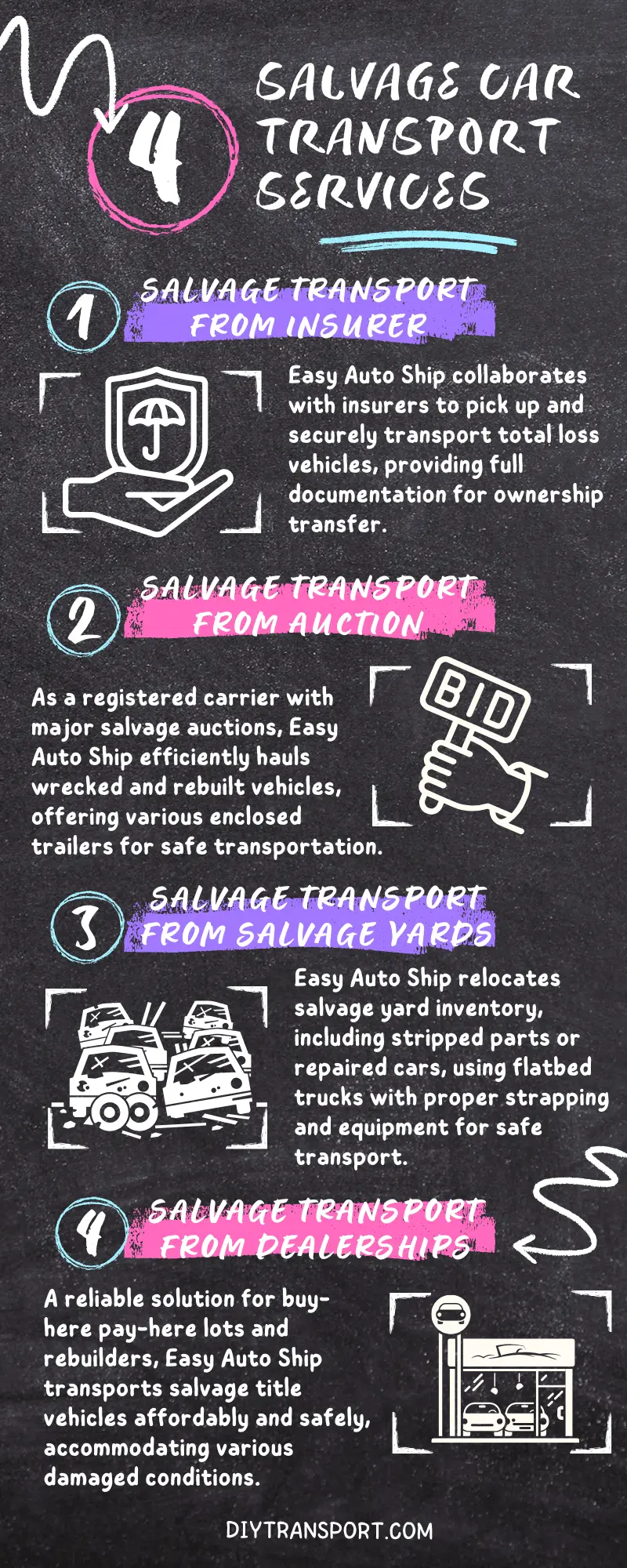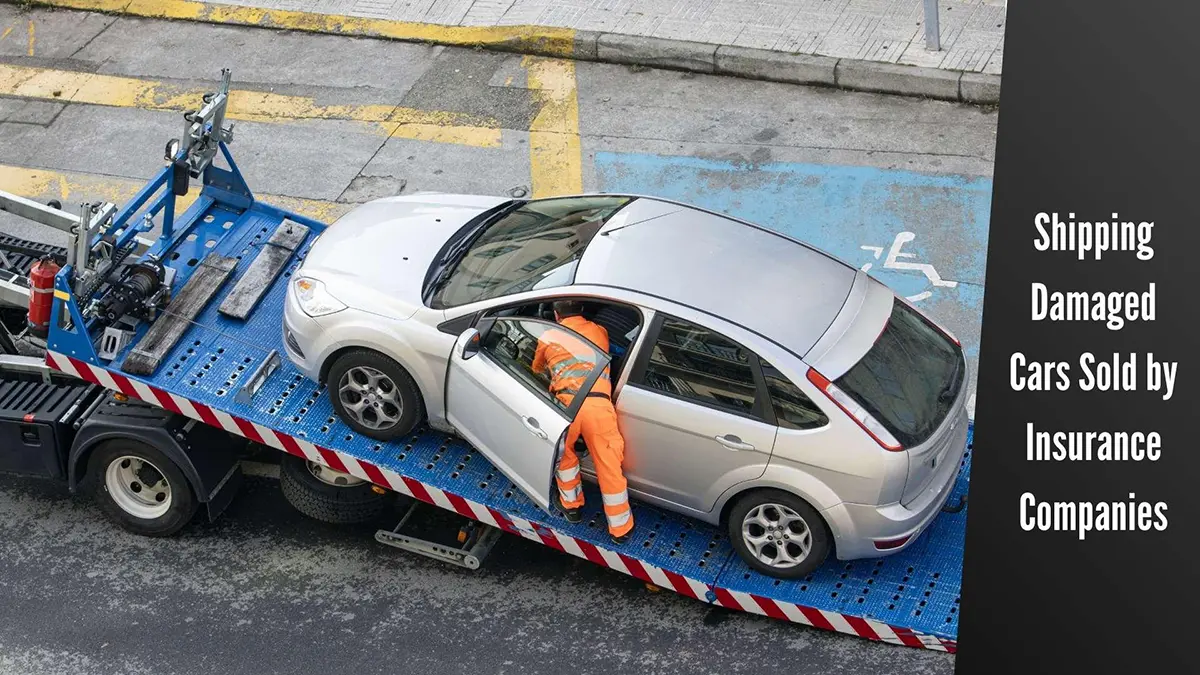Insurance agencies obtain many wrecked autos through claims each year. While some are too ruined for repair, others maintain enough value to sell on. Transporting these damaged vehicles securely necessitates careful prep and protected transport.
Numerous auction houses distribute damaged cars for sale by insurance companies nationwide. Safely moving these previously wrecked cars takes specialized protocols and loading practices. This post clarifies how shippers transfer damaged autos offered available to buy by repair shops and salvage yards across areas.
What’s Damaged/Salvaged Car Transport?
Damaged/salvaged car transport refers to the specialized process of transporting wrecked or damaged vehicles.
When a vehicle is in an accident and deemed a total loss by an insurance company, the insurance company will take possession of the wrecked vehicle. However, insurance companies do not have the means to transport these damaged cars themselves.
This is where damaged car transport companies provide a crucial service by transporting these totaled vehicles for sale by insurance companies to salvage auctions and dismantling facilities across the country.
Types of Damaged Vehicle Transport
There are a few different methods used to transport wrecked vehicles:
| Open Transport | The most common method which involves securing the vehicle to a flatbed truck and strapping it down for transport. | Carries 4-10 Vehicles |
| Enclosed Transport | For vehicles that are less damaged, they may be transported inside an enclosed truck or trailer. | Carries 2-6 Vehicles |
Securing Damaged Vehicles for Transport
Since wrecked vehicles may have unstable structures or parts hanging off, it is important they are safely secured during transport. Professionals use techniques like:
- Wrapping the vehicle in protective wrapping or tarping.
- Using straps, chains, and lug nuts to tightly bind the vehicle to the flatbed or inside the carrier.
- Removing loose objects, fluids, batteries to prepare the vehicle for transport.
Following standardized procedures helps ensure the totaled vehicles reach their destinations safely and without further damage during multi-vehicle hauls across state lines.
How Easy Auto Ship Helps You Move Damaged Cars
Easy Auto Ship has over 10 years of experience providing safe, compliant transportation solutions for all types of damaged vehicles.
Whether you need to ship a single salvage car across town or haul a loaded trailer of total losses to auction, we have the expertise and equipment to handle the job efficiently. The transport process with Easy Auto Ship involves the following steps:
- Step 1: Contact one of our client representatives to discuss your vehicle relocation needs, including pickup/drop-off details, dates, and vehicle specifics.
- Step 2: Receive a free quote without any obligations. We’ll provide pricing tailored to your requirements.
- Step 3: Once you book, a dedicated claims coordinator is assigned to your shipment to schedule pickup/delivery logistics.
- Step 4: On pickup day, our certified carriers will carefully prepare your vehicles for transport according to their condition.
- Step 5: Every shipment is tracked in real-time using GPS so you can follow your vehicles’ progress.
- Step 6: Our professional drivers safely and efficiently transport vehicles to their destination.
- Step 7: Upon arrival, vehicles are inspected and promptly unloaded.
Whether a single car or multi-vehicle loads, Easy Auto Ship uses our network to complete over 10,000 damaged vehicle transport jobs annually.

Give us a call to discuss arranging transportation for your damaged cars for sale by insurance companies.
Shipping Salvage Cars From Insurance Companies:
When an insurance adjuster deems a vehicle a “total loss” after an accident, the insurance company must sell the remaining asset. This is where Easy Auto Ship comes in. We work directly with insurers’ asset recovery teams to coordinate pickups of damaged vehicles from storage lots anywhere in the U.S.
Our team securely ties down the vehicles on open haulers or enclosed trailers and ensures they are transported with full documentation showing current ownership. At destination, we provide signed proof of delivery for each salvage car to smoothly transfer title to buyers like salvage yards.
Shipping Wrecked Cars From Auto Auctions:
The major salvage auctions sell thousands of wrecked and rebuilt vehicles each week relinquished by insurers. As a registered carrier with most auction companies, Easy Auto Ship is able to quickly schedule and complete load tenders to haul vehicles between auction yards.
We have a fleet of enclosed trailers from 20-53 feet to accommodate hauling one heavily damaged car or multiple drivable vehicles at a time. All drivers are trained in safe and compliant tarping, tiedown, and transportation of auction vehicles.
Transporting Damaged Cars From Salvage Yards:
Sometimes a salvage yard needs to relocate vehicles they have stripped for parts to sell online. Other times, they repair a car and want to send it to auction rather than keep it on their lot.
Easy Auto Ship can haul a variety of yard inventory such as crushed frames, parted-out hulks, or rebuilt cars. Using flatbed trucks with adequate strapping and equipment, we ensure these vehicles make it safely to their next destination.
Moving Non-Running/Salvage Cars From Dealerships:
Buy-here pay-here used car lots and rebuilders often buy salvage title vehicles cheap to fix up and resell. Easy Auto Ship is a smart solution for hauling these damaged cars for dealers trying to expand their inventory.
Whether transporting a van with drive-out transmission issues or a truck so bent it must ride flatbed, we safely move non-runners affordably and without further damage.
With dedicated claims handlers, real-time load tracking, and a network of specialist carriers, Easy Auto Ship handles thousands of damaged vehicle shipments safely and smoothly every year. Call or email us today to get a free quote for transporting total loss cars, damaged trucks, or any other automotive relocation needs.
Cost to Ship a Salvage Car
The cost to ship a salvage or damaged vehicle depends on several factors:
- Distance - Longer routes naturally increase mileage costs.
- Vehicle size - Larger trucks are needed for bigger cars, increasing rates.
- Specialized equipment - Salvage cars may require a forklift for loading, adding $100 per day to the bill.
- Carrier services - Some transporters have ramps and winches, saving the forklift fee.
Average pricing per mile
Most estimates put standard mileage rates between $1 to $0.40 per mile, averaging around $0.75 for a typical shipment. The distance traveled is usually the biggest predictor, as longer hauls see reduced per-mile costs.
| Distance | Base Price Per mile | Example Distance | Example Price | Estimated Time |
|---|---|---|---|---|
| 1-500 Miles | $1.00 | 400 miles | $400 | 2-4 Days |
| 500+ miles | $0.75 | 900 miles | $675 | 3-5 Days |
| 1,000+ miles | $0.60 | 1,200 miles | $720 | 4-6 Days |
| 2,000+ miles | $0.50 | 2,400 miles | $1,200 | 5-7 Days |
| 2,500+ miles | $0.40 | 3,600 miles | $1,440 | 7-9 Days |
Additional costs for salvage vehicles
As mentioned, using a forklift to load a damaged or non-operating car that cannot be driven onto the trailer can add $100-150 per day to the shipping bill.
Carriers equipped with ramps and winches avoid this expense. Proper tarping and tie-downs are also required to safely transport wrecked vehicles across state lines.
Which Vehicles Are Categorized as Wrecked or Salvaged?
Insurance firms and used car dealers sometimes obtain damaged cars for sale by insurance companies to resell as low-cost used vehicles.
However, consumers must understand risks of unknown problems from prior incidents like accidents, flooding, or fires. Thorough inspections help identify issues and ensure roadworthiness.
Totaled vehicles
Totaled vehicles are cars that insurance companies have deemed a total loss due to the cost of repairs exceeding the vehicle’s worth after an accident caused significant harm. Often following a collision that resulted in extensive damage, the insurer chooses to pay out the insured rather than spend more on fixing the automobile.
Flood damaged vehicles
Cars that have been submerged or partially immersed in flood waters fall into this group. Water damage from floods is difficult to detect and mend since it can ruin electrical systems and compromise frameworks beneath body panels.
Fire damaged vehicles
Vehicles destroyed or harmed by fire are another type. Exposure to flames can undermine structural integrity as heat warps metal components and melts plastic trim.
Stripped vehicles
Automobiles that vandals have pillaged spare parts and accessories from fall into this class. With valuable components removed, repairs become intricate and costly to complete.
Rollover vehicles
Cars involved in accidents where they tipped on their side or roof sustain substantial body and chassis harm typically. The act of rolling over poses risks for framework damage.
Salvage title vehicles
The DMV brands cars that insurers deem repairs surpassing a fixed percentage of a vehicle’s worth, often 75%, with a “salvage” designation on the title.
Rebuilt title vehicles
Previously salvaged automobiles can acquire a “rebuilt” title from the DMV after repairs and an inspection verify safety and integrity. However, questions remain regarding salvaged vehicles that later receive rebuilt designations.
Shipping a Wrecked/Damaged Car Vs Towing It Yourself
When transporting a wrecked or damaged vehicle, there are important logistical factors to ponder regarding the optimal method.
| Cost | $100-300+ fees | $50-150 (fuel only) |
| Enclosed vs Open Hauler | Enclosed: $1.3-$0.65 per mileOpen: $1-$0.5 per mile | - |
| Additional Costs | Load/unload assistance, liability coverage, potential fuel surcharges | Tow dolly rental fees, potential fuel surcharges |
| Travel Duration | Up to 500 miles/day | Varies (up to a week or more) |
| Risk Mitigation | Industrial webbing rated for securing, reduced risk of damage during transport | Minimal securing, increased risk of damage during transport |
| Towing Ability | Professionally equipped for towing heavy vehicles | Dependence on personal vehicle’s towing capabilities |
| Claim Practicality | Recommended for expedited claims processing, insurer disposal of vehicles | Potential issues with self-transports voiding policies, longer claim processing times |
| Overall Assessment | Winner | Loser |
Cost Considerations
Professional shipping will likely incur fees $100-300 or more depending on distance. An enclosed auto hauler can cost up to $5 per mile versus $2-3 for open haulers. Additional costs include load/unload assistance, liability coverage, and potential fuel surcharges. Towing oneself may only require $50-150 in fuel but no compensation is given. Insurance payouts for damaged cars for sale by insurance companies often have max dollar amounts for shipping versus self-transport reimbursement.
Travel Duration
Most shippers can transport up to 500 miles in a day whereas individual towing may complete half that depending on route, vehicle size/weight ratios, and road conditions/traffic. Cross-country shipping may take 4-7 business days while self-driving could extend to a full week or more with stops. Tow dolly rental fees also accumulate the longer the trip lasts.
Risk Mitigation
Professional haulers strap vehicles down with industrial webbing rated up to 8,000+ lbs to survive hard braking and winding roads. A self-transport with a wheeled tow dolly on highways provides minimal securing compared to an enclosed carrier. Insurance firms want to avoid liability for further damages from unsecured shifting loads during travel.
Towing Ability
Not all personal vehicles have factory-installed tow hitches, brake controllers, and heavy-duty alternators required to safely tow 3,000-7,000+ lb wrecked cars depending on make/model. Towing requires inspection, certification, and practice for rear visibility and weight distribution especially with large vehicles.
Claim Practicality
Insurers generally recommend professional shipping to expedite claims processing rather than facing issues with self-transports voiding policies. Signing damaged vehicles over also lets insurers dispose of them as needed and close out files faster.
Weighing these intricacies assists in choosing the safest and most cost-effective solution whether transporting damaged cars for sale by insurance companies or privately.
How Getting Damaged Cars From Insurance Companies Works
The process of how totaled vehicles are transferred from insurance companies to buyers.
1. Vehicle Assessment and Settlement
When a vehicle is in an accident deemed a total loss, the insurance company will assess the vehicle to determine if repairs would be over 60-100% of the car’s value. An appraisal is done and if totaled, the owner is paid a settlement for fair market value minus deductible. The insurance company then takes ownership of the totaled vehicle.
2. Insurance Auction of Wrecked Vehicles
Totaled vehicles are auctioned off by the insurance company, typically through a salvage auction yard. The auction is open to the public, including dismantlers and rebuilders interested in damaged cars for sale by insurance companies. Attendees can inspect vehicles and place bids, with the highest bid winning the auction.
3. Change of Ownership and Title
| New Owner | Title Change |
|---|---|
| Dismantler | Obtains salvage title from DMV for parts |
| Rebuilder | Repairs vehicle and applies for rebuilt title if passed inspection |
4. Options After Insurance Auction
The new owner of wrecked vehicles can dismantle for parts, fully repair and rebuild for resale, or store entirely. Rebuilt cars require re-inspection and are issued rebuilt titles if roadworthy, with some state restrictions on future resale. Partially repaired vehicles remain with salvage titles.
By auctioning off totaled/salvage/damaged vehicles, the insurance companies recover some costs from the settlement payouts through sale of damaged cars for sale by insurance companies. This offsets expenses incurred through the claims and vehicle loss process.
Price Differences Between Salvaged & Clean Titled Car:
A vehicle is declared a total loss by an insurance company when the costs to repair the vehicle exceed a certain percentage, usually around 60-80%, of the vehicle’s pre-accident market value. This determination is made by insurance company adjusters and appraisers based on an inspection of the vehicle and estimates for repairs.
Average Pricing Differences (Ford Explorer 2018 Base Model)
| Title Type | Average Sale Price |
|---|---|
| Ford Explorer 2k18 With Clean Title | $15,000 |
| Ford Explorer 2k18 With Rebuilt/Salvage Title | $9,000-$12,000 |
As the table shows, a salvage-titled car can sell for about 20% to 40% less than the same vehicle that has a clean title, according to Richard Arca, senior vice president of automotive valuation at Black Book.
Transferring Ownership to the Insurance Company
Once a vehicle is deemed a total loss, the insured owner must sign the vehicle’s title over to the insurance company in exchange for the claims settlement payment. This transfers ownership of the wrecked vehicle to the insurer.
Inspection and Valuation
The insurance company will then conduct a more thorough inspection and valuation of the damaged vehicle. Photos are taken, important details are recorded, and the estimated fair market value prior to the accident is reassessed.
Listing on an Insurance Auto Auction
Many large insurers sell totaled vehicles through major insurance auto auctions. The damaged cars for sale by insurance companies are photographed, described and assigned a reserve price or minimum bid amount based on the insurer’s valuation.
Sale at Physical or Online Auction
The totaled vehicles are then sold securely transported to large physical auction sites around the country or sold online through live internet bidding. Buyers can be salvage yards, body shops, dealers, or individuals seeking a project vehicle.
Frequently Asked Questions
Can you ship a car overseas with a salvage title?
Having a salvage title makes exporting a vehicle to another country more difficult, but not impossible. The import regulations of the destination country must allow vehicles with structural or flood damage. Working closely with an experienced auto transport company is important, as they are familiar with paperwork and certification required. It may take additional documentation and inspections to verify repairs were made according to standard. Planning ahead provides time for smoothly guiding a salvage-titled car between borders.
Can I bring a salvage car from USA to Canada?
Importing salvage vehicles from the USA into Canada needs special consideration. Canadian laws seek ensuring imported cars meet safety and emissions standards, plus confirming repairs don’t compromise integrity. For vehicles with a “rebuilt” salvage designation on the title, border agents will conduct thorough examinations to check for modifications. It is wise gathering proof of restoration from mechanics and shops, and papers from a past American insurance payout, to help speed acceptance. Salvage cars are allowed entry, although extra paperwork and patience may be needed compared with transporting undamaged automobiles.
Can you ship a car that won’t start or is inoperational?
Shipping non-running cars is an available service through firms experienced transporting damaged automobiles for sale by insurance companies. However, extra safety measures are vital since the inoperable state raises securement concerns during transit. Repair attempts prior to shipping can help get the motor turning over again. When that’s not possible, carriers work carefully securing hood, doors and trunk to protect against unwanted openings en route to the buyer or salvage yard. Good communication about the vehicle’s condition lets the transporter best prepare for proper safe transport of the non-starting vehicle.





